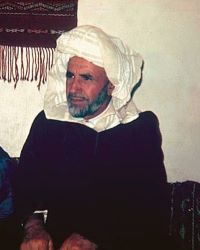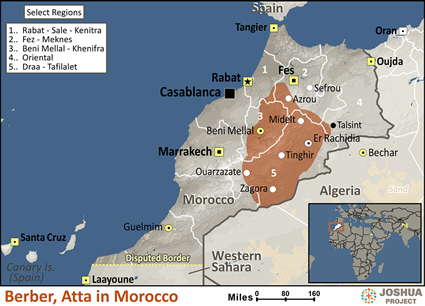The Atta refer to themselves by the name of their particular subgroup rather than using the term "Berbers". A Berber alphabet, probably derived from the ancient Punic script, has existed for around 2,500 years. Berbers used to be Christians, and St. Augustine was half Berber. The arrival of Arabs in Morocco in the 7th century led to the gradual conversion of some Berbers to Islam. It was not until the thirteenth century, however, with the arrival of large numbers of Arabs from the Middle East, that the majority of Berbers accepted Islam, learned the Arabic language, and were assimilated into Arab culture.
Since the Sahara Desert is a harsh environment, most of the Saharan tribes occupy several oases. The Berber economy is based on a delicate balance between farming and cattle raising. Every tribe, without exception, depends heavily on domestic animals for carrying heavy loads, milk and dairy products, meat, and hides or wool. No Berber tribe depends on farming for survival. Hunting rarely contributes to the food supply, as wild game is scarce in their part of Morocco.
Like other Berbers, the Atta are officially Muslim, but they include animistic traditions such as beliefs in the “evil eye” in their form of Islam.
Atta Berbers need access to the gospel. Their lifestyle and heart language both present challenges in sharing the gospel with them. They need regular gospel radio broadcasts in their Central Atlas Tamazight language. It's hard for rural people to find gospel materials. A bigger obstacle might be the obstacle of the heart; to them, Christianity is for someone else.
Pray for those who are beginning to find Christ among the Atta Berber community, that the Lord would protect and nurture their faith, and that they would find one another to fellowship and grow together.
Pray they would be rooted and established in love.
Pray the Berbers of Morocco would have access to the good news of Jesus in many forms, hearing clearly who he is in their mother tongue.
Scripture Prayers for the Berber, Atta in Morocco.
| Profile Source: Joshua Project |

























